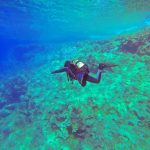Motion sickness or seasickness when scuba diving, as it is commonly referred to, occurs to people when they are overwhelmed or when they are over processing things in their surroundings. The mind and body begin to get mixed signals that make you sick. The messages that reach the body, ears and eyes become contradictory. The eyes may begin to see different stationary objects on the shore or water and the body starts to feel the motion. On the other hand, the ears create a response as they try to retain balance and keep your body upright.

The Body’s Response
With all this confusion happening, seasickness when scuba diving make the body begins to go through several steps and cycles with nausea being the result. Initially, you feel anxious. You may feel panic or confusion as you body tries to stabilize and figure out what needs to be done. When the nausea finally sets in you may end up vomiting. It can be trying for you on a dive, but there are some things that you can do to reduce or eliminate these effects.
The Remedies
Even though there is no proven cure for seasickness, some options help with curing or at least reducing the symptoms.
- Antihistamines – These can easily be bought over the counter and are said to help. If you will be diving, you need to use them very cautiously because they may cause drowsiness and you need to stay alert during the dive. If these do not work, it may be best to use a prescription pill given by your doctor instead.Moreover, antihistamines tend to have side effects that may pose a danger to divers. These include blurred vision and dry mouth. As such, whichever solution you select to help ease or cure seasickness should be carefully selected. Additionally, you should know the side effects on you before taking any medication of this sort. The effect of one type of treatment on one person may not be the same on another. As such, try taking the medication ahead of your diving trip so that you can see how it will affect you before going on a dive.Whichever medication you select should make your diving trip better. As such, it is important that you select a method that works for you and don’t mess with anything else.
- Alternative Treatments – Many divers prefer to use other alternative treatments that include garlic, ginger and bracelets. Others go the extra mile and mix them all up.
Unfortunately, seasickness when scuba diving is not particularly reliable beast and on some days you may feel nauseous despite all of your best attempts at self help. The bottom line is that motion sickness can be managed and minimized by planning ahead with sufficient sleep, profer food intake, use of medications and consciously taking avoidance actions while on-board, before the first signs of motion sickness manifest.
Its important to know what to do if the condition does get the best of you. However, if you follow the steps listed in this article, you will find your susceptibility greatly reduced and your enjoyment of the underwater world given new life as a result with us.






